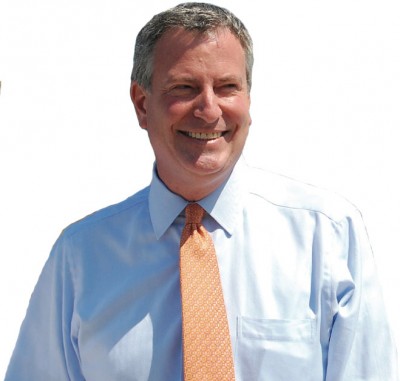Background: De Blasio began working in public service under David Dinkins, and eventually moved to working as the regional director in the U.S. Department of Housing and Urban Development. In 2000, he managed Hillary Clinton’s campaign for the U.S. Senate. In 2002, he started working as a member of the New York City Council, where he spent eight years, centering his attention on public education, middle class, working poor and many other areas. In 2010, de Blasio was appointed as New York City public advocate.
Stop and Frisk: De Blasio has publicly spoken for extensive reform of stop-and-frisk policy, stating that the use of racial profiling is harmful to police-civilian relationships. Part of the reforms he has proposed on his website involve a change in the New York Police Department leadership, a racial profiling bill and an inspector general.
NYU Connection/ stance on NYU issues: De Blasio earned his undergraduate degree from NYU in 1984. His City Planning Commission appointee voted against the NYU 2031 plan. He also signed the letter to NYU President John Sexton asking him to allow graduate, research and teaching assistants to have union representation at the university.
Economics: To lower unemployment in New York City, de Blasio has spoken in support of small businesses and immigrant businesses as a way to lower unemployment in New York City. He said he will push to pass legislation that will provide more benefits for the working class, and also that he will ensure that workers who are not as skilled will have training and job placement opportunities. He also plans to encourage manufacturing in the city.
City Policies: De Blasio said he will open health clinics for city employees at their workplaces, which will give those workers and their families opportunities for checkups, vaccines and prescriptions. He plans to stop extensions of term limits, and begin a transparency policy in the City Council.
Key Affiliations: De Blasio worked underneath then-Secretary of Housing and Urban Development Andrew Cuomo and former President Bill Clinton when he worked as regional director for the H.U.D.
Transportation: In terms of city bike lanes, de Blasio said he wishes to increase the amount of trips taken by bikes by six percent before 2020. Along with this, he would like to increase bike sharing and bike lanes. De Blasio wishes to extend aid to the outer boroughs for their subway needs.
Education: De Blasio said the city needs to focus on improving traditional public schools, even if they are low-performing as opposed to shutting them down. He wants to slow the growth of charter schools by charging them rent on the space they wish to use in existing school buildings. When asked about how he would change Mayor Bloomberg’s policy on education, de Blasio said he would change the focus away from test results and push art and physical education. He said “the education of our city’s children is more important [to me] than test results.” He has also expressed the need for more job-focused education in the public school system to better prepare students to work or for college, and has stressed the need to have universal pre-kindergarten for all children.
Housing: De Blasio wants to help build affordable housing for the working-class New Yorker. He said that under Bloomberg’s policies, developers, who were building grandiose, unnecessary housing, were getting too many tax incentives. He wants developers to be required to build for low and middle income families. His plan would include 50,000 new affordable housing developments over the next decade.
Health: De Blasio agrees with Bloomberg’s controversial ban on large-sized, sugary drinks. He would also continue the distribution of birth control and the morning-after pill in city schools. When the Affordable Care Act is put into full effect, de Blasio plans on leading an outreach campaign focused on those who will be eligible for coverage under the ACA, which will increase coverage for New York City residents.






















































































































































